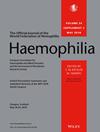Factors Influencing Symptoms of Depression, Anxiety and Stress in Patients With Haemophilia
Abstract
Introduction
Patients with haemophilia (PwH) often suffer from psychological symptoms such as depression or anxiety. To date, uncertainty exists about the determinants predicting worse psychological outcomes. Therefore, this study aimed to investigate the extent of depressive, anxiety and stress-related symptoms in PwH compared to the healthy population and determine the impact of disease-specific and arthropathy-related parameters.
Methods
Levels of depression, anxiety, stress and overall emotional distress were queried in a total of 379 PwH and 271 healthy controls by handing out the Depression, Anxiety and Stress Scale 21. In addition, disease-specific variables (e.g., type, severity, viral infections), pain intensity (NRS from 0 to 10), pain persistence (Likert-scale from 1 to 6), pain sensitivity (pressure pain thresholds [PPT]) and the orthopaedic joint score (Haemophilia Joint Health Score v2.1; HJHS) were assessed to analyse associations with psychological symptoms.
Results
PwH had higher scores for depression, anxiety, stress and overall emotional distress compared to the healthy cohort. Regarding disease-specific outcomes, only PwH with hepatitis or HIV showed higher scores for depression (hepatitis, p = 0.020), stress (hepatitis, p = 0.005; HIV, p = 0.048) and overall emotional distress (hepatitis, p = 0.020). Spearman's rank correlation further revealed significant associations between NRS, pain persistence, PPT and HJHS with all psychological outcomes, though most effect sizes were weak.
Conclusion
These results provide further evidence for a poorer psychological profile in PwH compared to the healthy population. Particularly, pain-related outcomes, but also joint degeneration and the presence of viral infections, are related to enhanced psychological symptoms.


 求助内容:
求助内容: 应助结果提醒方式:
应助结果提醒方式:


